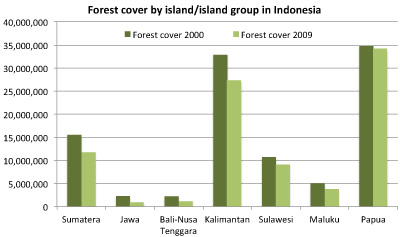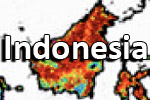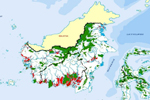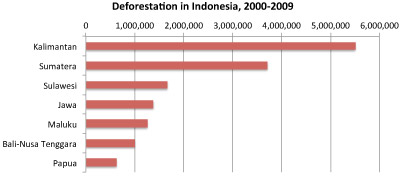Indonesia will establish a REDD+ agency to support the country’s efforts to reduce emissions from deforestation and forest degradation, according to a statement released by Indonesian President Susilo Bambang Yudhoyono’s office.
The agency will be created by a new REDD+ Task Force headed by Kuntoro Mangkusubroto, an adviser to President Yudhoyono. Kuntoro ran Indonesia’s first REDD+ Task Force, whose mission expired June 30. The charter of the new REDD+ Task Force will run through December 31, 2012.
The REDD+ agency — which will report directly to the president — will be charged with coordinating activities related to Indonesia’s REDD+ program, including establishing an independent and reliable deforestation monitoring system, preparing national strategies for reducing deforestation and forest degradation, monitoring the implementation of the President’s moratorium on new forestry concessions in primary forests and peatlands, and implementing the country’s REDD+ pilot project in the province of Central Kalimantan on the island of Borneo. The agency also aims to coordinate international finance for the REDD+ program.

|
The announcement could help temper rising concern over Indonesia’s commitment to reducing deforestation. In recent months the Ministry of Forestry has halved Rimba Raya, the country’s showcase REDD+ project in Central Kalimantan, while the nationwide logging moratorium disappointed environmentalists and failed to meet conditions laid out under the billion dollar pact Indonesia signed with Norway in May 2010. Progress on other components of Indonesia’s REDD+ program have been slow.
Indonesia has one of the highest deforestation rates in the world, losing 1.5 million hectares per year between 2000 and 2009. Forest destruction is primarily driven by industrial activities, especially logging, mining, and the establishment of oil palm and pulp and paper plantations. Small-scale agriculture also contributes to forest loss.
Editor’s note: the initial version of this post confused the new REDD+ Task Force with the new REDD+ agency. We apologize for the error.
Related articles
Ministry of Forestry continues to undermine Indonesia’s REDD program, finds Reuters
(08/17/2011) Indonesia’s Ministry of Forestry is continuing to undermine the country’s ambitious forest protection program in favor of industrial forestry interests, reports Reuters.

(07/27/2011) Indonesia’s forests were cleared at a rate of 1.5 million hectares per year between 2000 and 2009, reports a new satellite-based assessment by Forest Watch Indonesia (FWI), an NGO. Expansion of oil palm and wood-pulp plantations were the biggest drivers of deforestation, yet account for a declining share of the national economy. The study, which compared year 2000 data with 2009 Landsat images from NASA, found that Indonesia’s forest cover declined from 103.32 million hectares to 88.17 million hectares in ten years. Since 1950 Indonesia lost more than 46 percent of its forests.
Is the Ministry of Forestry undermining Indonesia’s logging moratorium?

(06/28/2011) Indonesia’s Ministry of Forestry is already undermining the moratorium on new forestry concessions on peatlands and in primary forest areas, alleges a new report from Greenomics-Indonesia. The report, The Toothless Moratorium, claims that a new decree from the Ministry of Forestry converts 81,490 hectares of forest protected under the moratorium into logging areas. The area affected is larger than Singapore.
(06/17/2011) World Resource Institute’s summary of key elements, and unanswered questions, in Indonesia’s recent moratorium on new forest permits.
Interview with Indonesian climate official on rainforest logging moratorium

(06/03/2011) In May, Indonesia President Susilo Bambang Yudhoyono issued a presidential instruction laying out the specifications for a two-year moratorium on new concessions in primary forests and peatlands. The moratorium aims to create a window for Indonesia to enact reforms needed to slow deforestation and forest degradation under its Letter of Intent with Norway, which would pay the Southeast Asian nation up to a billion dollars for protecting forests.
Lack of clarity complicates Indonesia’s logging moratorium

(05/27/2011) Lack of clarity makes it difficult to assess whether Indonesia’s moratorium on new logging concessions in primary forest areas and peatlands will actually reduce greenhouse gas emissions from deforestation, according to a new comprehensive assessment of the instruction issued last week by Indonesian President Susilo Bambang Yudhoyono. The analysis, conducted by Philip Wells and Gary Paoli of Indonesia-based Daemeter Consulting, concludes that while the moratorium is “potentially a powerful instrument” for achieving the Indonesian president’s goals of 7 percent annual growth and a 26 percent reduction in greenhouse gas emissions from a projected 2020 baseline, the language of the moratorium leaves significant areas open for interpretation, potentially offering loopholes for developers.
